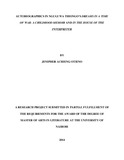| dc.description.abstract | The autobiography portrays characteristics which show its worth as a creative work. It is on this
strength that this study attempts a literary inquiry into Ngugi wa Thiong’o’s Dreams in a Time of
War: A Childhood Memoir and In the House of the Interpreter to discuss artistry. This study
shows how Ngugi’s narratives employ various strategies to craft the story of his childhood life.
Through autobiographical approach, the study examines the nature and the functions of
autobiography to find out to what extent the two narratives are autobiographical in form. The
study focuses on the aspects of autobiography as used by Ngugi to craft the narratives of his life.
Further, it outlines how cohesion in the two narratives has been achieved. It ascertains that
through deliberate choices of events and experiences, Ngugi succeeds in projecting the thematic
concerns in his autobiography. His use of story, plot, characters, and the first person narrative
voice as aspects of artistry results in aesthetic appeal and unity of his story in the two narratives. | en_US |

